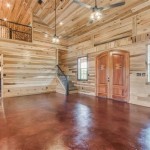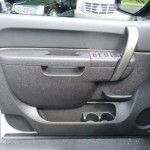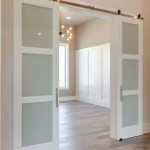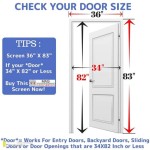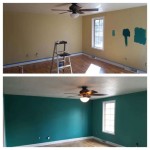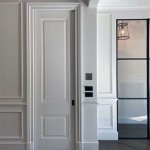Interior Doors: A Comprehensive Guide to Glass and Wood Options
Interior doors play a crucial role in defining the aesthetics, functionality, and privacy of a living space. The choice between glass and wood, or a combination of both, significantly impacts the overall ambiance and perceived value of a home. This article explores the various considerations involved in selecting interior doors, focusing on the characteristics, benefits, and applications of glass and wood doors.
Understanding the Characteristics of Wood Interior Doors
Wood interior doors offer a timeless appeal, characterized by their natural warmth, versatility, and sound insulation properties. The selection of wood species is a primary factor influencing the door's appearance, durability, and cost. Common choices include solid wood doors, hollow-core doors, and engineered wood doors.
Solid wood doors, crafted from a single piece of lumber, provide exceptional durability, soundproofing, and inherent strength. They are typically more expensive due to the cost of materials and the level of craftsmanship involved. Solid wood doors are susceptible to warping and shrinking in environments with fluctuating humidity levels, requiring careful maintenance.
Hollow-core doors consist of a wooden frame with a lightweight core, often made of cardboard or honeycomb material. These doors are significantly lighter and more affordable than solid wood doors, making them a popular choice for interior applications where heavy-duty performance is not required. While providing basic privacy, hollow-core doors offer minimal sound insulation and are less resistant to impact damage.
Engineered wood doors, constructed from layers of wood veneers or composite materials bonded together, offer a balance between affordability, stability, and aesthetic appeal. Medium-density fiberboard (MDF) and particleboard are common core materials used in engineered wood doors. These doors are less prone to warping and cracking than solid wood doors and can be finished to mimic the appearance of various wood species. They often have a better fire rating compared to hollow-core.
The style of a wood door is another important consideration. Panel doors, featuring recessed or raised panels within a frame, are a classic choice that complements a wide range of architectural styles. Flush doors, with their smooth, uninterrupted surface, offer a minimalist and contemporary look. French doors, with multiple glass panes within a wooden frame, are an elegant option for connecting interior spaces while allowing natural light to flow through.
Exploring the Advantages of Glass Interior Doors
Glass interior doors provide a modern and sophisticated aesthetic, enhancing natural light penetration and creating a sense of spaciousness. They are particularly well-suited for areas where maximizing light and visibility is desired, such as living rooms, offices, and hallways. Different types of glass, each with unique properties and characteristics, can be used in interior doors.
Clear glass allows for maximum light transmission and unobstructed views. However, it offers minimal privacy. For applications where privacy is a concern, frosted glass, which diffuses light and obscures visibility, is a popular choice. Frosted glass can be achieved through various techniques, including acid-etching and sandblasting.
Tempered glass, also known as safety glass, is significantly stronger than ordinary glass and is designed to shatter into small, relatively harmless fragments if broken. This makes it a safer option for interior doors, reducing the risk of injury. Laminated glass, consisting of two or more layers of glass bonded together with an interlayer, offers enhanced safety and security. In the event of breakage, the interlayer holds the glass fragments in place, preventing them from scattering.
Decorative glass, featuring patterns, textures, or colors, adds visual interest and character to interior doors. Stained glass, etched glass, and beveled glass are examples of decorative glass options that can be used to create unique and personalized designs. The level of customization available with decorative glass doors is almost limitless.
The frame material surrounding the glass is also an important consideration. Wood frames provide a traditional and warm look, while metal frames, such as aluminum or steel, offer a sleek and contemporary aesthetic. Frameless glass doors, also known as sliding glass doors, create a seamless transition between spaces and maximize the flow of light.
Combining Glass and Wood: Hybrid Door Designs
Many interior door designs incorporate both glass and wood to achieve a balance between aesthetics, functionality, and privacy. These hybrid doors offer the best of both worlds, combining the natural beauty and warmth of wood with the light-enhancing properties of glass.
French doors, mentioned earlier, are a classic example of a hybrid design. These doors typically feature multiple glass panes within a wooden frame, allowing natural light to flow through while maintaining a degree of privacy. The size and number of glass panes can be customized to suit the specific needs and preferences of the homeowner.
Panel doors with glass inserts are another popular option. These doors feature a wooden frame with one or more glass panels inserted into the frame. The glass panels can be clear, frosted, or decorative, depending on the desired level of privacy and aesthetic appeal. The wood frame can be stained or painted to complement the surrounding décor.
Sliding barn doors with glass panels offer a rustic yet modern look. These doors typically feature a wooden frame with one or more glass panels, suspended from a track mounted above the doorway. Sliding barn doors are a space-saving solution that adds character and visual interest to any room. The combination of wood and glass creates a striking contrast that enhances the overall aesthetic.
When selecting a hybrid door design, it is important to consider the proportions of glass and wood. Too much glass can compromise privacy, while too little glass may not provide the desired level of natural light. The style and finish of the wood frame should also complement the overall design of the room.
Factors to Consider When Selecting Interior Doors
Choosing the right interior doors involves careful consideration of several factors, including the intended use of the room, the desired level of privacy, the available budget, and the overall architectural style of the home. Functionality, aesthetics, and durability are all important aspects to evaluate.
The intended use of the room will influence the type of door that is most appropriate. For bedrooms and bathrooms, privacy is a primary concern, so solid wood doors or doors with frosted glass inserts are often the best choice. For living rooms and hallways, glass doors or doors with clear glass panels can help to maximize natural light and create a more open and airy feel.
The available budget is another important consideration. Solid wood doors are typically the most expensive option, while hollow-core doors are the most affordable. Engineered wood doors and doors with glass inserts offer a balance between cost and performance. It is important to weigh the cost of the door against its long-term value and durability.
The overall architectural style of the home should also be taken into account. Traditional homes typically benefit from classic door styles, such as panel doors with ornate details. Modern homes often look best with minimalist door styles, such as flush doors or frameless glass doors. Selecting doors that complement the architectural style of the home will enhance its overall aesthetic appeal.
Furthermore, hardware, such as doorknobs, hinges, and handles, should be selected to complement the style and finish of the doors. These details can have a significant impact on the overall look and feel of the interior space. The quality of the hardware should also be considered, as it will affect the durability and functionality of the doors.
Maintenance and Upkeep of Wood and Glass Interior Doors
Proper maintenance is essential to ensuring the longevity and beauty of interior doors. The specific maintenance requirements will vary depending on the type of door and the materials used in its construction.
Wood doors should be cleaned regularly with a soft cloth and a mild detergent. Avoid using abrasive cleaners or solvents, as these can damage the finish. Solid wood doors may require periodic refinishing to protect them from moisture and wear. It's also important to address any issues with warping or cracking promptly to prevent further damage.
Glass doors should be cleaned with a glass cleaner and a soft cloth. Avoid using abrasive cleaners or scouring pads, as these can scratch the glass. Glass doors with decorative elements may require special cleaning techniques to avoid damaging the design. Regularly inspect the seals around the glass panels and replace them as needed to prevent drafts and moisture damage.
Hardware should be cleaned and lubricated regularly to ensure smooth operation. Loose screws should be tightened, and worn hinges should be replaced. Consider using a protective coating on metal hardware to prevent tarnishing and corrosion.
By following these maintenance guidelines, homeowners can help to preserve the beauty and functionality of their interior doors for many years to come.

Builders Choice 32 In X 80 Solid Core 1 Lite Clear Glass Unfinished Fir Wood Interior Door Slab Rv1501fircls28 The Home Depot

Krosswood Doors 72 In X 80 Rustic Knotty Alder 10 Lite Low E Glass Both Active Solid Core Wood Double Prehung Interior Door Phid Ka 410 60 68 134 Aa The Home Depot

8 0 Tall 3 4 Lite Clear Glass Pine Interior Wood Door Clearance Center

Mmi Door 32 In X 80 Right Handed Unfinished Pine Wood Clear Glass 10 Lite True Divided Single Prehung Interior Z019939r The Home Depot

Krosswood Doors 72 In X 80 Rustic Knotty Alder 10 Lite Low E Glass Both Active Solid Core Wood Double Prehung Interior Door Phid Ka 410 60 68 134 Aa The Home Depot

Mmi Door 36 In X 80 Right Handed Unfinished Pine Wood Clear Glass Full Lite Single Prehung Interior Z019931r The Home Depot

Builders Choice 28 In X 80 Solid Core 10 Lite Clear Glass Unfinished Fir Wood Interior Door Slab If151024c The Home Depot

Steves Sons 36 In X 80 Universal Full Lite Obscure Glass Unfinished Solid Core Pine Wood Interior Door Slab Sip0000006259 The Home Depot

Builders Choice 24 In X 80 Solid Core 10 Lite Clear Glass Unfinished Fir Wood Interior Door Slab If151020c The Home Depot

30 In X 80 1 3 8 Clear Glass Lite Shaker Primed Solid Wood Core Interior Door Slab Com
Related Posts

